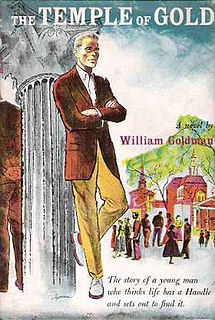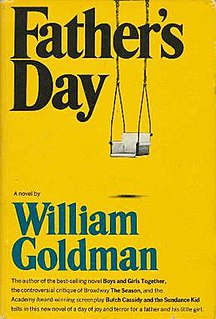
Eugene Allen Hackman is a retired American actor, novelist, and United States Marine. In a career that has spanned more than six decades, Hackman has won two Academy Awards, four Golden Globes, one Screen Actors Guild Award, and two BAFTAs.

William Goldman was an American novelist, playwright, and screenwriter. He first came to prominence in the 1950s as a novelist before turning to screenwriting. He won Academy Awards for his screenplays Butch Cassidy and the Sundance Kid (1969) and All the President's Men (1976). His other known works include his thriller novel Marathon Man and his cult classic comedy/fantasy novel The Princess Bride, both of which he also adapted for the film versions.

Peter Bogdanovich is an American director, writer, actor, producer, critic, and film historian. One of the "New Hollywood" directors, Bogdanovich's career started as a film journalist until he got hired to work on Roger Corman's The Wild Angels (1966). After that film's success, he directed his own film Targets (1968), a critical success. He later gained wider popularity for his critically acclaimed drama The Last Picture Show (1971), which earned eight Oscar nominations including Academy Award for Best Director.

Marathon Man is a 1974 conspiracy thriller novel by William Goldman. It was Goldman's most successful thriller novel, and his second suspense novel.

Larry Jeff McMurtry was an American novelist, essayist, bookseller, and screenwriter whose work was predominantly set in either the Old West or contemporary Texas. His novels included Horseman, Pass By (1962), The Last Picture Show (1966), and Terms of Endearment (1975), which were adapted into films. Films adapted from McMurtry's works earned 34 Oscar nominations.
John Frederick Milius is an American screenwriter, director, and producer of motion pictures. He was a writer for the first two Dirty Harry films, received an Academy Award nomination as screenwriter of Apocalypse Now, and wrote and directed The Wind and the Lion, Conan the Barbarian, and Red Dawn. He later served as the co-creator of the Primetime Emmy Award-winning HBO series Rome.

American Gigolo is a 1980 American neo-noir crime drama film written and directed by Paul Schrader and starring Richard Gere and Lauren Hutton. It tells the story about a high-priced escort in Los Angeles who becomes romantically involved with a prominent politician's wife while simultaneously becoming the prime suspect in a murder case.

Magic is a 1978 American psychological horror film starring Anthony Hopkins, Ann-Margret and Burgess Meredith. The film, which was directed by Richard Attenborough, is based on a screenplay by William Goldman, who wrote the novel upon which it was based. The score was composed by Jerry Goldsmith.

Moment by Moment is a 1978 American romantic drama film written and directed by Jane Wagner and starring Lily Tomlin and John Travolta. It was produced by Robert Stigwood and released by Universal Pictures on December 22, 1978.
Elliott Kastner was an American film producer, whose best known credits include Where Eagles Dare (1968), The Long Goodbye (1973), The Missouri Breaks (1976) and Angel Heart (1987).

Texasville is a 1990 American drama film written and directed by Peter Bogdanovich. Based on the 1987 novel Texasville by Larry McMurtry, it is a sequel to The Last Picture Show (1971), and features Jeff Bridges, Cybill Shepherd, Cloris Leachman, Timothy Bottoms, Randy Quaid, and Eileen Brennan reprising their roles from the original film.

Battlefield Earth is a 2000 American science fiction action film based on the 1982 novel by Scientology founder L. Ron Hubbard. It was directed by Roger Christian and stars John Travolta, Barry Pepper, and Forest Whitaker. The film follows a rebellion against the alien Psychlos, who have ruled Earth for 1,000 years.

Mr. Horn is a 1979 Western television film chronicling the life of Tom Horn. It was directed by Jack Starrett from a screenplay by William Goldman.

Black Magic is a 1949 film adaptation of Alexandre Dumas's novel Joseph Balsamo. It was directed by Gregory Ratoff. Set in the 18th century, the film stars Orson Welles in the lead role as Joseph Balsamo, a hypnotist, magician, and charlatan who also goes by the alias Count Cagliostro, and Nancy Guild as Lorenza/Marie Antoinette. Akim Tamiroff has a featured role as Gitano. The film received mixed reviews.

The Temple of Gold is a 1957 novel by William Goldman. It was Goldman's first novel, and launched his career.

Boys and Girls Together is a 1964 novel by William Goldman. The title is taken from lyrics in the song, "The Sidewalks of New York".

The Thing of It Is... is a 1967 novel written by William Goldman about Amos McCracken, a 31-year-old man who has written a popular show tune and who is having marriage troubles.

Father's Day is a 1971 novel by William Goldman. It is a sequel to The Thing of It Is... and revolves around a day in the life of now-divorced Amos McCracken as he looks after his daughter for a day.
Michael J. O’Hara is an American author, screenwriter and producer.

No Way to Treat a Lady is a 1964 novel by William Goldman.

















